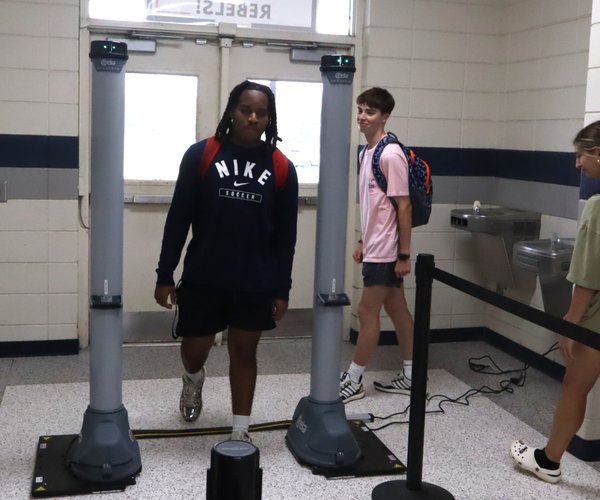The religious freedom bill vetoed last month by Gov. Nathan Deal could be revived in a future General Assembly session, state Rep. Jon Burns said.
Burns, the state House of Representatives majority leader, said at the Effingham Chamber of Commerce’s Eggs and Issues Review breakfast that House Bill 757 is expected to debated again in next year’s session. Gov. Deal vetoed the bill, which drew opposition from several groups and also was believed to have put Atlanta’s chance to host a Super Bowl in danger.
HB 757’s final version passed the House 104-65 and was approved 37-18 in the Senate. The bill, also known as the Pastor Protection Act, was designed to allow clergymen the ability to not perform weddings that went counter against their beliefs.
“The language in 757 that passed out of the House and Senate was a well-thought-out piece of legislation,” Burns said. “It wasn’t a knee jerk bill put together in the last few days.”
There was input from the faith, business and lesbian, gay, bisexual and transgender communities on the bill, Burns said.
“All of the folks involved sat around a table and agreed to the language,” he said. “They sat down and looked at language of bill and agreed it was not discriminatory. It protected the rights of all Georgians in a respectful manner. I would have never spoken for the bill, never voted for the bill, if had not done just that.”
Burns said he respected the governor’s decision to veto the bill and noted it was a difficult decision for Deal. He added the General Assembly will look at the legislation again next year.
“It takes years sometimes to pass good legislation,” he said. “The process does work.”
Effingham’s legislative delegation — Burns, state Rep. Bill Hitchens and state Sen. Jack Hill — also discussed topics such as the pipeline moratorium bill. HB 1036, which places a one-year moratorium on the use of eminent domain by petroleum pipeline companies, creates a study committee that will report to the General Assembly about the pipeline approval process.
Hitchens praised the work of Burns, who detached his staff attorney for Hitchens’ use, and Hill in helping him with the legislation.
“I’ve never been involved in such an ordeal in my life,” Hitchens said. “I have never ever had blood pressure issues. I had a lot of support. It would have never passed without these two people.”
Hitchens even acknowledged he sought refuge in Burns’ office from the lobbyists and others massing at his office door.
“They had 25 of the best lobbyists working against Bill,” Burns said.
The measure to allow pipeline companies the ability to seek eminent domain was passed in 1994, but Hitchens pointed out that land bought privately also was not susceptible to certain environmental protections.
“In a democracy, everybody is concerned about lobbyists and their influence,” Hill said. “This is a time when legislators stood up to lobbyists and do what was the best for their constituency. It was a victory for democracy. It was a good thing to see. There was intense political pressure.”
The study commission formed through HB 1036 will include three members of the House, three from the Senate, the state Environmental Protection Division director, the Department of Community Affairs director and five experts appointed by the governor. Two Effingham landowners, Henry Morgan and Alan Zipperer, also testified before the House Energy, Utilities and Telecommunications Committee.
HB 1036 was one of the last bills to make it before Crossover Day, the final day on the calendar when the two chambers can pass legislation before it goes to the other chamber for consideration. Hitchens said the fight over the bill was a “knockdown, drag-out.” He was called into Speaker David Ralston’s office to talk about the bill, and the speaker told the parties there “no biting, no kicking and no scratching. That’s how bad it got.”
Said Burns: “It goes to show you the independence of the legislative process. The legislation is not about stifling economic development in our state. It’s about bringing common sense to the process. Petroleum pipelines are regulated by this state. Eminent domain for the benefit of a private company or a private group is just not right. We looked deeper into the environmental concerns and it’s who cleans up the spill on a pipeline. We don’t have that addressed in our statutes at this time. Hopefully we will address these types of issues. I’m really proud of Bill and Jack in the Senate. We were able to prevail. I’m proud of the House and Senate for standing up for individual property rights.”
All three legislators also praised the moves to improve transportation in Effingham County and southeast Georgia, especially the $44 million from the state for the Effingham Parkway.
“In last 50 years, there haven’t been any new roads from Chatham County to Effingham County,” said Hitchens, whose district includes western Chatham County. “We’ve grown from 10,000 to nearly 60,000 and we still have the same highways. It’s been frustrating to some of our economic development, too.”
The parkway, Hitchens said, will have a significant impact not just on traffic in Effingham but also at the intersection of Highway 21 and Interstate 95 in Port Wentworth.
“My phone rings every day about it,” he said.
The interchange of Interstates 16 and 95 will be re-worked as well, Hitchens said.
“That’s going to be a significant undertaking,” he added. “They are going to make it safer and more efficient. The grades on (the ramps) are horrific. You don’t have any room to enter and exit.”
Said Burns: “Orange cones are a sign of progress, and it will be good for Georgians.”
The state’s budget, which awaits the governor’s signature, tops $23 billion, up from $21.8 billion from fiscal year 2016.
“The budget has grown some because of the economic health of our state continues to improve,” Burns said. “Our budget addresses the needs of Georgians in many ways.”
While spending is up, when adjusted for inflation, Burns noted, the state’s expenses are back to a 1998 level per capita, and the state’s population has grown by 2 million since.
“The purpose of government is the protection of the people,” Hitchens said. “We do everything from pave the roads to provide education and take care of people who can’t take care of themselves.”
Hill, who is the longtime chairman of the Senate Appropriations Committee, called this year’s budget a chance to catch up with raises for state workers, with public health nurses and Georgia State Patrol troopers getting a 3 percent boost.
“For a budget that only grew 4.3 percent it was a conservative budget that spending went for good purposes,” Hill said.
Burns said he was visiting with a friend in Summerville, S.C., where one of the largest high schools in the Palmetto State. When work on the school started, it was on an unimproved, two-lane county road. With the school near completion, “it’s still on an unimproved two-lane road,” Burns said.
That incident draws a distinction between Georgia and its neighbors, according to Burns.
“We have decided not to kick the can down the road,” he said.
The Legislature took steps to boost education. Burns extolled reducing state mandates on local school systems and cutting back on state testing requirements.
“It is absolutely crucial to what many of us have advocated for years, and that’s local control,” he said.
The state has added $150 million to account for growth in schools and another $300 million was put in the Quality Basic Education formula, in the hopes it be used by local systems to augment teachers’ salaries.
“Effingham County has provided pay raises and did it before it was cool,” Hill said of the Effingham County Board of Education.
The FY17 budget is “filling in around the edges of the austerity cuts we’ve been suffering through,” Hill said. “We’re slowly but surely eliminating that.”
Working with House Education Committee chairman Rep. Brooks Coleman, a former teacher, principal and assistant superintendent, and the state Board of Education, the decision to remove the Salzburgers from Georgia history curriculum in middle schools was reversed.
“Our chairman reminded us that Georgia history is not just about Georgia,” Burns said, “but it’s about the history of this country.”
Two measures to enable gambling in Georgia failed to garner enough support in the General Assembly in the recent session, but odds are one of them could come back before lawmakers.
Hill said he could support a bill to allow pari-mutuel betting, or horse racing, under certain conditions. But a bill to allow for casinos to operate in Georgia is a much more difficult sell.
“The business side of casino gambling is not good,” Hill said.
Hitchens, the former commander of the state Department of Public Safety, said he spoke with the superintendent of the New Jersey state police, who is a friend. Hitchens said the regulatory measures are expensive to enforce. Hitchens said it also could bring, organized crime, drugs and prostitution to areas where casinos are built.
“I believe morally and ethically it is not something people in Georgia don’t need to get involved with,” he said.
The lawmakers added casino gambling’s impact on the state’s HOPE scholarship revenues likely would be negligible.
Hill extolled the state’s investment in economic development, and he pointed to DRT America officials’ assertion that an available, trained workforce was one of the reasons they chose Effingham for their first U.S. facility.
The budget includes $10 million for Invest Georgia, which will help firms emerging from business incubators stay in Georgia. Hill also praised the state’s QuickStart program and the technical college system.
“They also provide an avenue to get a career or continue with their education,” Hill said. “These are real, tangible elements that are important in economic development today.”
While other states, including those with oil revenues, struggle with their bottom lines, Hill said that’s not the case in Georgia.
“I don’t know that I’d trade places with another state,” he said. “Our future, particularly right here in Effingham, for the next 10 years we have a wonderful opportunity to build and grow and have our young people a chance to come back.”
Said Burns: “Georgia’s future is bright; Effingham County’s future is bright.”








